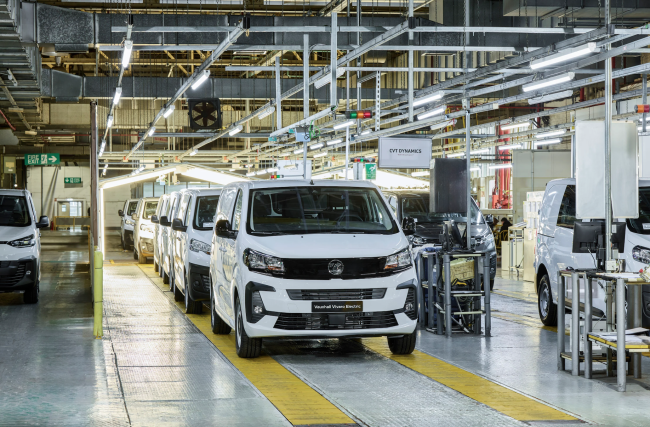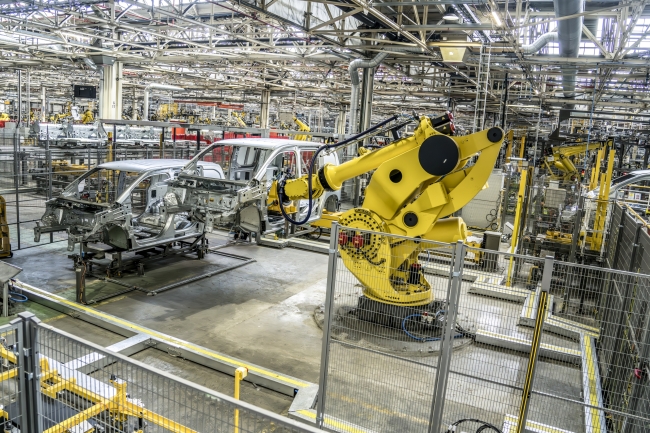4 minute read - 29th April 2024
Commercial vehicle production up again but car production down as factories adjust to new models
UK commercial vehicle output rose by 27.4% in the first quarter of 2024, the best Q1 performance since 2008, according to figures published by the Society of Motor Manufacturers and Traders (SMMT). In total, 32,626 vans, trucks, taxis, buses and coaches left factory lines, up 18.6% on pre-pandemic 2019 volumes, with demand driven by overseas orders.
Exports rose 57.9% to 23,060 units in the first quarter – an increase of 8,452 vehicles to account for 70.7% of year-to-date output, up from 57.0% in Q1 2023. The EU remained the top export destination, with more than nine in 10 vehicles (96.7%) heading for the bloc. Production for the UK market, meanwhile, declined -13.1% to 9,566 units.
Growth in January and February, however, was followed by a -19.2% decline in March output to 7,943 units – the first monthly fall since September 2023. Exports declined by -12.6% to 5,084 units against the same month last year, with 732 fewer units made, while production for the UK fell -28.8% to 2,859 units. The performance reflects market normalisation as manufacturers have worked hard to meet strong pent up pandemic-related demand, as well as some temporary supply chain shortages and the early Easter bank holiday reducing working days in the month compared with 2023. Growth is still expected this year, with the latest independent outlook expecting light van production volumes to hit over 135,000 units – a result of electric vehicle output ramping up.

British commercial vehicle production output growth continues with the best Q1 figures since 2008 / Picture: Stellantis
Never miss the latest manufacturing news by signing up to our newsletter here
In contrast, UK car production declined in March, down -27.1% year-on-year to 59,467 units. It was the first fall since August last year and is in line with expectations for a variable year, as manufacturers adjust factories to produce the next generation of cars, notably electric, winding down volumes of existing models in the process. An early 2024 Easter bank holiday also played a part, with fewer working days this March than the year before. Overall, UK car production remained up 1.1% in the first quarter, at 222,371 units, with a 33.9% rise in output for the UK offsetting a -7.4% decline in exports. Despite this fall, by far the majority – 72.7% – of all cars made in Britain in Q1 were for export.
Volumes for the UK declined marginally, down just -0.3% to 19,995 units, while production for export fell -35.9% to 39,472 units, although more than six-in-10 cars made in March were shipped overseas. Continuing recent trends, the European Union received by far the bulk of exports (57.9%) followed by the US (11.4%), China (5.9%), Australia (4.0%) and Japan (1.8%). Shipments to the top five export markets, apart from the US, all fell.
Electrified vehicle (battery electric, plug-in hybrid and hybrid) volumes again represented more than a third of all production (38.4%) with manufacturers producing a combined 22,865 units, although this was down -29.7% on the year before in part reflecting the issues outlined earlier, notably model changeovers.

British car production fell in March, as manufacturers gear up to make new models, but rounded off Q1 with overall volumes still up 1.1% / Picture: Stellantis
Mike Hawes, SMMT chief executive, said: “It’s good to see UK CV production record its best Q1 performance in some 16 years, success testament to the determination of manufacturers to deliver for this vital sector, while investing in the latest cutting edge, ultra low and zero emission technology. Global demand continues for British-built commercial vehicles, emphasising the need for favourable market conditions to sustain our production capabilities for increasingly green vehicles. This means reducing energy costs, upskilling our workforce and maintaining free and fair trade deals, the result of which will allow us to attract further investment to improve productivity and decarbonise automotive manufacturing and its supply chain.”
Regarding car production, he added: “This fall is not unexpected given the wholesale changes taking place within UK car factories as existing models are run out and more plants transition to electric vehicle production. We can expect further volatility throughout 2024 as manufacturers lay the foundations for a successful zero emission future. Recent investment announcements have boosted confidence and enhanced the UK’s reputation but there needs to be an unrelenting commitment to competitiveness. Free and fair trade deals must be secured, energy costs reduced and the workforce upskilled if we are to attract further investment to improve productivity and decarbonise automotive manufacturing and its supply chain.”
